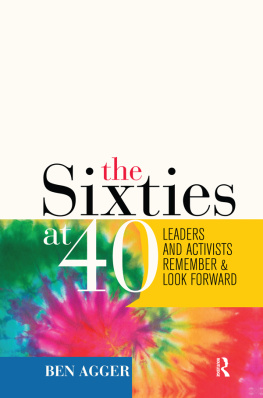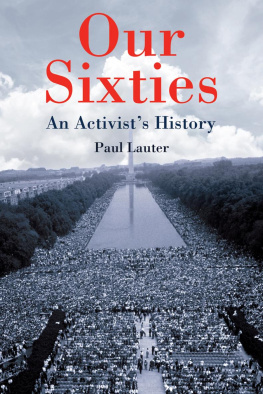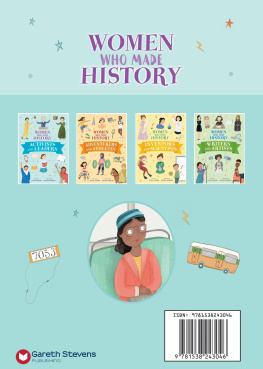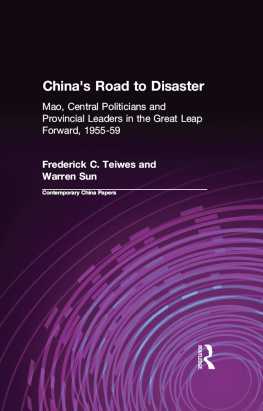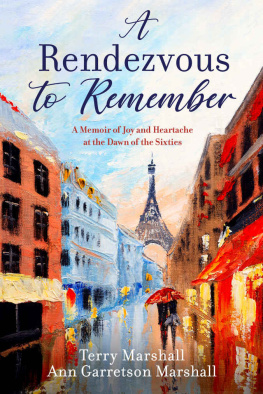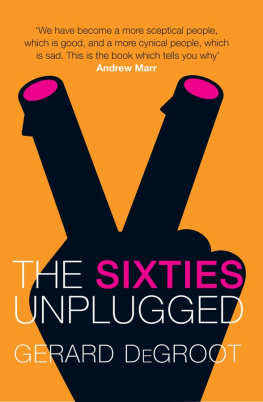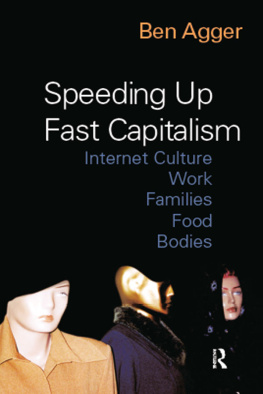The Sixties at 40
Leaders and Activists Remember and Look Forward
Ben Agger
For Kreg Viestenz and all the others
First published 2009 by Paradigm Publishers
Published 2016 by Routledge
2 Park Square, Milton Park, Abingdon, Oxon OX14 4RN
711 Third Avenue, New York, NY 10017, USA
Routledge is an imprint of the Taylor & Francis Group, an informa business
Copyright 2009, Taylor & Francis.
All rights reserved. No part of this book may be reprinted or reproduced or utilised in any form or by any electronic, mechanical, or other means, now known or hereafter invented, including photocopying and recording, or in any information storage or retrieval system, without permission in writing from the publishers.
Notice:
Product or corporate names may be trademarks or registered trademarks, and are used only for identification and explanation without intent to infringe.
Library of Congress Cataloging-in-Publication Data
Agger, Ben.
The sixties at 40 : leaders and activists remember and look forward / Ben Agger.
p. cm.
Includes bibliographical references and index.
ISBN 978-1-59451-691-7 (hardcover : alk. paper)ISBN 978-1-59451-692-4 (pbk. : alk. paper)
1. Protest movementsUnited StatesHistory20th century. 2. Peace movementsUnited StatesHistory20th century. 3. Civil rightsUnited StatesHistory20th century. 4. Political activistsUnited StatesHistory20th century. 5. United StatesHistory19611969. 6. United StatesPolitics and government19611963. 7. United StatesPolitics and government19631969. 8. Nineteen sixtiesHistory.
I. Title.
HN59.A533 2009
303.66097309046dc22
2009015324
Designed and Typeset by Mulberry Tree Enterprises.
ISBN 13 : 978-1-59451-691-7 (hbk)
ISBN 13 : 978-1-59451-692-4 (pbk)
Contents
The sixties would not have brought such significant gains on many fronts without the enormous courage of so many people. This was physical courage: You could get killed. It was emotional courage: People stood up for what they believed in, and they broke ranks with comfortable consensus and risked ostracism. Today, people hew to the center because that is safe. It is easy to forget the courage of earlier generations, or perhaps people do not know of it. This book presents profiles in courage.
At the end of this book, I speak of walking the Oregon coast in 1968 after Lyndon Baines Johnson announced that he would not seek a second term as president. Bobby Kennedy, who threw his hat in, could not have known that he would die shortly because of that decision. The rough Oregon surf was a metaphor of the sixties. It boiled with the blood of those who sacrificed or were simply innocent. Occasionally, treasures would be disgorged from the pounding, blood-stained surf: civil rights legislation, an end to the war, the empowering of a generation. I have not been back to that beachperhaps my generations Omaha Beachbut I would find it still roiling and crimson. The blood of the Vietnamese and civil rights workers would have been replaced with that of Iraqis and Afghans and, as always, of our own soldiers, who never seemed to have a chance. But this time the prized Japanese glass floats deposited onshore from faraway fishing nets would be called Barack Obamaborn of the sixties and of our struggles then. Watching Jesse Jackson cry on election eve in November 2008 made me aware of the connections that tie us to that era, when courage animated great and enduring deeds. These were tears of joy. He had shed different, sorrowful tears forty years earlier when he watched Martin Luther King die. I want to remember the sixties by crying tears of joy, but also by mourning those many who gave their lives and liberty to the movement. Those like me who were privileged and avoided war have an obligation to tell these stories, so that we can put an end to war and death and injustice.
I could not have written this book without the help and support of my fourteen interview subjectsthe people who helped make the sixties. Of course, it is their book because these are their words. Others offered invaluable assistance, editorial and intellectual. The manuscript was read by Lionel Lewis, Tim Luke, Steve Dandaneau, Roxanne Dunbar-Ortiz, Tom Hayden, Steve Maizlish, Ken Philp, Jeremy Varon, Kevin Wehr, and Becky Thompson. Assistance was provided by Chesa Boudin, Naomi Jaffe, and Sam Greene. Gary Mack of the Sixth Floor Museum in Dallas clarified crucial issues for me about the JFK assassination. Dean Birkenkamp advised me patiently to rethink the first version and restructure the second version. I resisted, but, to quote Charles Lemert, Dean is always right! Finally, finally, we got to the finish line with this version. In retrospect, I was trying to solve the riddle of the sphinx: how I belong to the sixties and how they belong to me. Sharon Daugherty of Paradigm performed the exhausting and exhaustive photo research and secured permissions, helping the book become available to a multimedia generation of readers. She and I know that the book would have been delayed a decade had I tried to do that skilled work!
Invaluable assistance was provided by a number of Eugeneans. Heather Briston and Lesli Larson of the University of Oregon archives opened the vault of images and memories. President David Frohnmayer of the University of Oregon provided the key to the vault. Fred Tepfer took a number of important photos and was unfailingly helpful and cheerful. Freddy, as we knew him then, was a partner in crime at South Eugene High School those many years ago. Dan Goldrich helped me look for something that probably does not exist! Caroline Imbert, an adopted Eugenean, offered me many wonderful photos of Eugene and Oregon, one of which I use toward the end of this book. Adrian Vaaler, Kerry Viestenz, and Kathleen Allison provided indispensable background information.
Like it or not, we live in interesting times.
Robert Kennedy
If you can remember anything about the sixties, you werent really there.
Paul Kantner
By now, the subject of the sixties should have been laid to rest. There have been many books, articles, films, and songs about that tumultuous decade. I am a baby boomer, raised in modest comfort, as Tom Hayden said of our middle-class generation at the beginning of Students for a Democratic Societys (SDS) 1962 Port Huron Statement, which launched the New Left. We baby boomers are obsessed with ourselves, including our own pasts. But my interests are neither nostalgic nor antiquarian. This is not a definitive history. Rather, I look forward by looking back, learning from that time forty years ago in order to grapple with our present difficulties and opportunities. In particular, I want to tell the sixties to young people for whom the sixties are but a rumor of marijuana and album rock. They need to know that we were young once.
The decade is becoming clear to me only long after the fact, which is perhaps the way it always is when people living in turbulent times fail to understand the convergence of their personal histories with history itself, adolescence blurring with activism. I want to sort this out, but in a way that offers insights to kids today, to whom history seemed closed off until Obama.
A book like this should begin with true confessions that disclose the authors perspective on the past and the present. Although I fondly remember certain things about the sixtiescivil rights, early SDS, my first kiss, concertsI have come to realize, as I did research for this book, that I did not particularly like the sixties. There was too much pain and too many casualties, on all sides. But there is something I dislike more than the sixties, and that is the dominance of the Right, today and yesterday. The Right blames the sixties for all that is wrong and uses this blaming to push back the significant gains of civil rights and equal opportunity achieved in that decade. In addition, and this comes out more clearly when I discuss the unraveling of the sixties into revolutionary politics, the Right was challenged by a Left in its imageviolent, dogmatic, closed. What I remember most vividly about my last years in high school is how people on both sides used derogatory terms such as gook, pig, and nigger. Peoples complex humanity was reduced to slogans that dehumanized. I am hopeful that Barack Obamas recent election will move us beyond race, which was always the way to go. As a parent, I realize that kids do not see color and they are the future.


